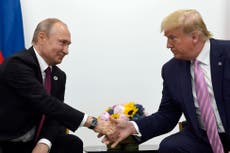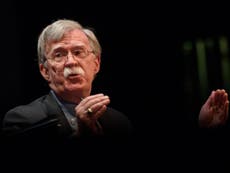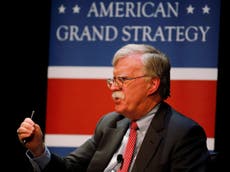The Independent's journalism is supported by our readers. When you purchase through links on our site, we may earn commission.
I asked people who know John Bolton about the claims in his book. This is what they told me
'I'd love to see a case end up in the Supreme Court'

Show a reasonably politically aware American (or occasional cable news viewer) a photo of John Robert Bolton, and depending on their level of engagement with the news — or their political affiliation — they’ll bring up any number of things.
For some, the first thing that comes to mind is his unabashed enthusiasm for making use of American military forces, or his disdain for nearly all international multilateral agreements.
Others might note his longstanding reputation as a hawk when it comes to so-called “rogue states” and the pursuit of nuclear weapons.
Those on the leftward end of the American political spectrum might call him a “war criminal” on account of his history as a cheerleader for the 2003 US invasion of Iraq, while casual consumers of political news over the past decade or so might know him only as the bearer of what might be the most iconic, walrus-like mustache to grace the White House grounds since the time of Theodore Roosevelt (sorry, David Axelrod).
But thanks to President Donald Trump and the Bill Barr-led Department of Justice, countless Americans will now remember the 71-year-old lawyer, diplomat, and ex-Trump administration national security adviser as a best-selling author.
The fact that Bolton’s forthcoming book, The Room Where It Happened, would reveal details about Trump’s push to withhold $391 million in aid to Ukraine in order to strong-arm that country’s president into announcing a pair of sham investigations into former Vice President Joe Biden and his son Hunter has been known since January.
Bolton was among the numerous administration witnesses from whom House Democrats had wanted to hear testimony on Trump’s Ukraine scheme, but he never showed up for his November 7 deposition and let it be known that he’d file a lawsuit if House Intelligence Committee Chair Adam Schiff tried to compel his testimony via subpoena. Bolton changed his tune two months later by offering to testify at Trump’s trial before the GOP-controlled Senate — but only if 51 senators voted to subpoena him.
And as Trump’s trial entered its second week, The New York Times reported that many of the details sought by Democrats would be available in Bolton’s forthcoming book, publication of which would come after a routine prepublication review by a career National Security Council official meant to ensure that the book did not include any classified information.
While some federal agencies — such as the FBI and CIA — require former employees to submit books and articles they author after employment for such a review, the nondisclosure agreements signed by National Security Council employees do not impose the same mandate unless a manuscript addresses intelligence matters that could touch on Sensitive Compartmentalized Information, a term used for the government’s most closely held secrets (generally sources and methods for intelligence-gathering).
According to Bolton attorney Charles Cooper, the former national security adviser only submitted his manuscript for review “out of an abundance of caution,” and after a four-month process, the career NSC official overseeing the review — an expert who has gone through such procedures with many would-be authors — informed his client that a revised version of his manuscript had eliminated any classified passages. But rather than provide him with the customary letter attesting to his book’s suitability for publication, the Trump administration withheld the clearance letter indicating its completion and launched two subsequent rounds of review by (less qualified) political appointees, both Trump loyalists rather than career experts.
In response, Bolton and his publisher, Simon and Schuster, began moving forward with plans to release the version of the book which the career official had said contained no classified information, and in a statement released last week, Bolton signaled his intentions: “Game on”.
Trump, who has evidently never heard of the “Streisand Effect,” reacted to the news on Monday by making the nonsensical claim that any conversation he had with Bolton is per se classified. He then presumably had a hand in ordering Barr’s Justice Department to file what amounted to a 27-page advertisement in the form of a lawsuit seeking to block the book’s release based on the administration’s claim that it still “contain[s] significant amounts of classified information”.
Shortly after news of the lawsuit broke on Tuesday, The Room Where It Happened shot to the top of Amazon’s bestseller list. Yet Trump, apparently unsatisfied with his work as Bolton’s unpaid literary publicist, continued his de facto promotion of the book — while undermining the case laid out in court documents — by taking to Twitter and dismissing the book as “made up of lies and fake stories” (neither of which can properly be classified).
And as has become common in the days before the release of any book by a Trumpworld insider, a steady stream of “scoops” has appeared in the pages of America’s top newspapers, courtesy of those reporters lucky enough to be handed advance copies.
Their efforts have revealed, among other things, how the book claims that Trump encouraged Chinese dictator Xi Jinping’s construction of concentration camps for Uighur Muslims, begged Xi to purchase American agricultural products to help his electoral chances this year, promised Turkish dictator Recep Tayyip Erdogan that he’d interfere in a Justice Department case against a Turkish gold trader, and released a bizarre, rambling statement defending the Saudi government’s murder of Washington Post columnist Jamal Khashoggi to distract from his daughter-adviser Ivanka’s use of — wait for it — a private email server to conduct government business. And yes, the book corroborates the case laid out by Democrats during Trump’s impeachment trial.
The steady stream of revelations from Bolton’s book has also united most Republicans and many Democrats in their shared disdain for the man one Democratic activist referred to as “the War Walrus,” either because he betrayed President Trump by writing what appears to be a meticulously documented book detailing his unfitness for office, or because he declined to testify during the House impeachment probe into President Trump and is now using what he knew then to cash in with a book now.
But as for the Trumpworld claims that Bolton is either an inveterate liar or a sloppy national security risk who is carelessly damaging the country’s security to make a buck, those who’ve known Bolton, those who’ve worked with him, and those who’ve fought both him and his former boss have the same response: Not a chance.
“He would never put anything in [a book] that was classified,” said Reed Hundt, who was a year behind Bolton as a Yale University undergraduate, and was later in Bolton’s class at Yale Law School.
Hundt, who served as chairman of the Federal Communications Commission under the Clinton administration, added that he and Bolton “never agreed on anything,” but nevertheless said it was “not the least bit surprising” that Bolton would break with Trump because Bolton “has a lot of respect for intelligence and knowledge” and “is not an ignorant loud-mouth”.
Another person who has worked alongside Bolton, an attorney who served with him in the Reagan and George H W Bush-era Justice Department, was also skeptical of the claim that Bolton would be careless with information that could cause grave damage to US national security if revealed.
Asked if he believed Bolton would be careless enough to include classified information in a book manuscript, the former DOJ official replied: “I would be surprised.”
“I would think that he would know the difference between what's classified and what's not,” said the former official, who requested anonymity because of pending business before the federal government. “Surely, he wanted to get the book out, so he wouldn't include it [classified information] in the manuscript.”
But it’s not only former colleagues and classmates who don’t buy the administration’s claim that Bolton would mishandle classified information. Even those national security professionals who have fundamental disagreements with Bolton are confident that he would adhere to the rules.
Ned Price, a former CIA analyst who served as a National Security Council spokesperson during the Obama administration but left the CIA rather than serve under Trump, said it was highly unlikely that Bolton would have included any legitimately classified information in his book given his decades of experience in the national security establishment.
“People who have been in the national security environment for years — or decades, in his case — have a good sense of what's classified and what's not, and may have a good sense of what counts as top secret information, what counts as secret information, and what counts as confidential information, because there are precise definitions behind each of these,” Price said, adding that the goal of a prepublication review is typically to ensure that intelligence sources and methods are properly protected.
“With someone of his seniority in his position, you don't see a sort of protracted back-and-forth because they have a good sense going into it — ‘this is classified, this is not’ — and what strikes me about all of this is that the career official responsible for reviewing these manuscripts told Ambassador Bolton in April that… according to her review, it didn't contain classified information,” Price continued. “But then, lo and behold, she sent it up to someone with less experience, but who was closer to the president… and that person came to a different determination… and the National Security Adviser — someone who had not been in senior levels of national security roles before, lo and behold, found there were reportedly classified elements in there. The whole thing reeks of abuse of power… of a vindictive effort to keep this book from seeing the light of day.”
Another former Bolton colleague who clashed with him repeatedly during the early 2000s, former Undersecretary of State for Political Affairs Nicholas Burns, stressed that he and Bolton “have very different worldviews,” but called the ex-Trump national security adviser “very smart, very dedicated, and very trustworthy” when it comes to protecting the nation’s secrets.
“These allegations that somehow he's playing fast and loose do not strike me as the John Bolton that I worked with… From someone who has often been an opponent of his on substantive policy grounds, John is a straightforward, serious, credible, honest person in my judgment,” said Burns, who added that while Bolton should have testified before the House during the impeachment inquiry into President Trump’s conduct regarding Ukraine, he found the president’s behavior as described in what is known of Bolton’s book so far to be “disgraceful” and “unprecedented in modern American history”.
And while the judge who will hear the government’s arguments against Bolton on Friday — Royce Lamberth — is a Reagan appointee and former Foreign Intelligence Surveillance Court chief judge who has long been skeptical of sweeping classification claims by the government, given the Trump administration’s penchant for litigation, it’s possible that no matter the outcome of Friday’s hearing the Justice Department will take the case as far as it can go.
For Hundt, Bolton’s Yale Law classmate, that’s an outcome he would not mind seeing.
“Hopefully the case will be litigated to the highest possible court” in order to get a “definitive decision, defeating what undoubtedly is the gross overreach of the administration on this topic,” he said.
Noting that two of their Yale Law classmates — Samuel Alito and Clarence Thomas — currently sit on that “highest possible court,” Hundt predicted that both would side with Bolton if his case were to come before them.
“I'd love to see a case end up in the Supreme Court, where Alito and Thomas will know the truth,” he said. “They'll know that he would never disclose any national security information.”






Join our commenting forum
Join thought-provoking conversations, follow other Independent readers and see their replies